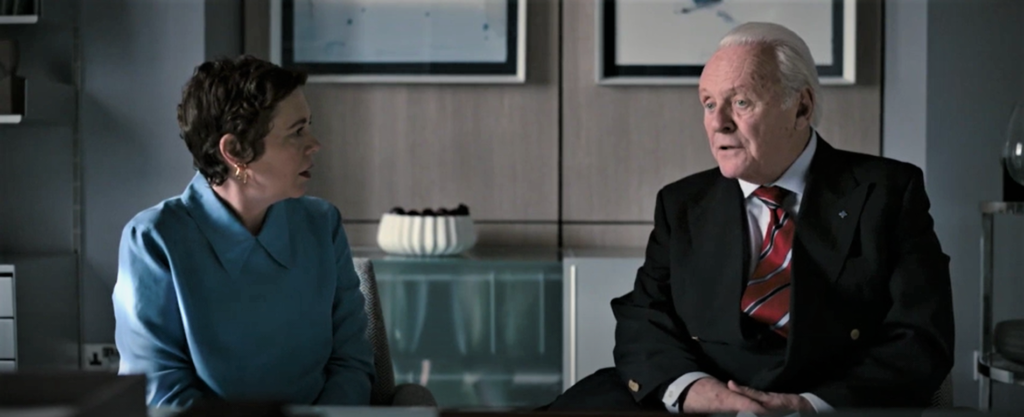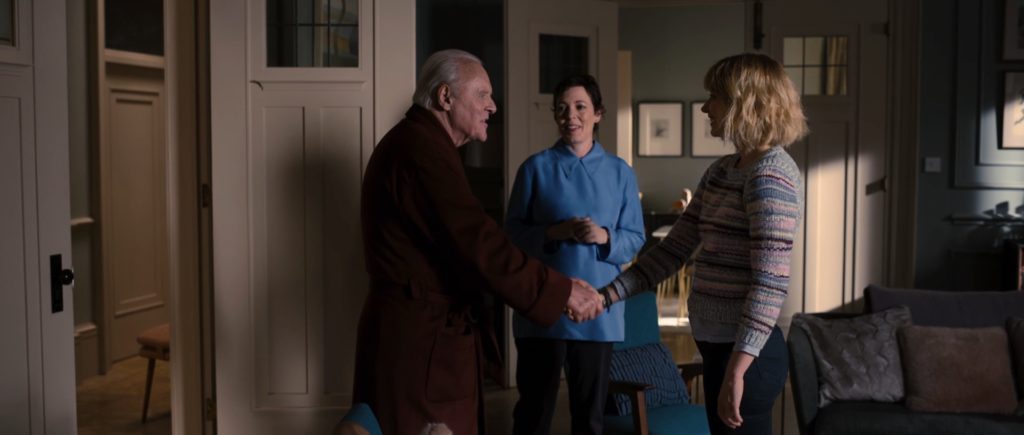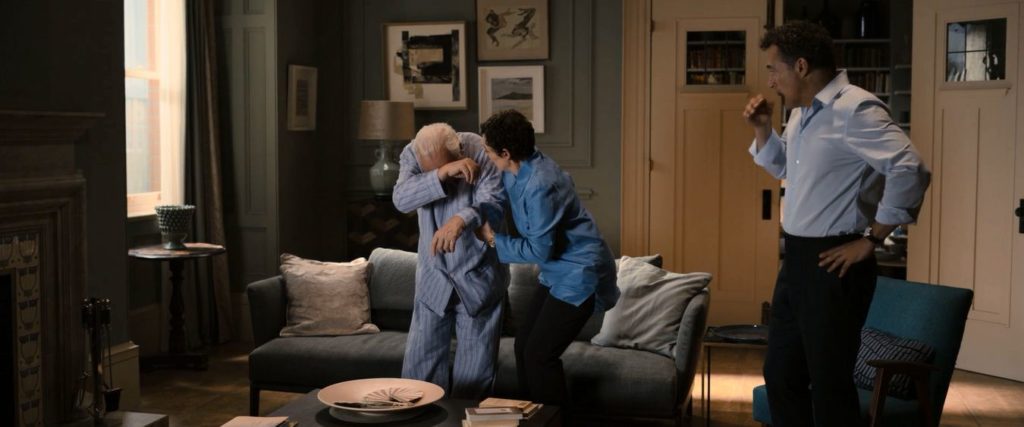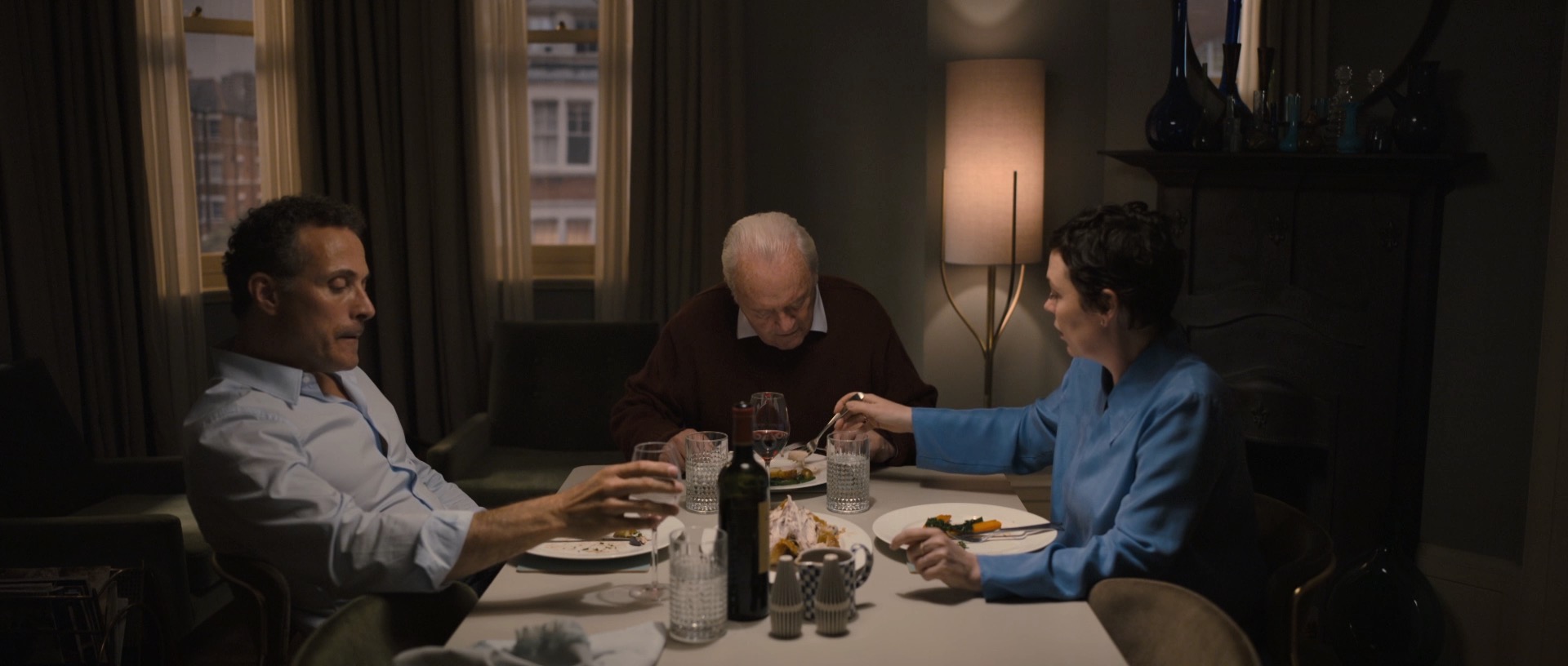It may not quite feel like one at first glance, but the more you think about it, The Father is a horror movie. And that’s because it feels so real, to the point of being as discomforting as any good psychological thriller. And like any good psychological thriller, it deliberately deceives you into thinking that it is going to be something that it ultimately isn’t. Beginning with the basics of its relatively simple premise of an aging man named Anthony (Sir Anthony Hopkins) refusing help from his daughter, Anne (Olivia Colman), or any other care provider as his mental state gradually deteriorates, it will feel familiar to those familiar with the setup until it doesn’t. After that, it will largely feel familiar to those who have witnessed the devastating effects of dementia firsthand.

With The Father, writer-director Florian Zeller- who wrote and developed the play upon which the film is based- pulls no punches as he confidently makes every effort to put the audience in the mind of someone whose grip on reality has all but vanished. It’s a dazzling testament to Zeller’s abilities as a director as he makes his first transition from stage to film appear as if he’s been working behind a camera his entire career. The dialogue he fashions with co-writer Christopher Hampton, along with the work of production designers Peter Francis and Cathy Featherstone, collectively makes the downward spiral of dementia startlingly tangible, doing so in a way that can be comprehended by everyone except the person it directly affects. The same, single set of Anthony’s flat is ingeniously and gradually manipulated as certain circumstances in the old man’s life change with the drop of a hat. One minute Anne is preparing to move to Paris, the next she is struggling to find her father a proper care provider while also dealing with the negative energy generated by her husband, Paul (Rufus Sewell). The simultaneous changes in furnishings and mood are the precise indicators of Anthony’s ever-changing mindset, leading us all, in turn, to question if there’s any semblance of truth to what we see and hear.
One would only have to look to these unstable features to think they were watching a modern-day Hitchcock film. Plot twists abound, but not the kind rooted in dramatic intention. In fact, rather than one grand twist that changes the direction of the narrative, The Father opts for a series of smaller twists, each one as confusing and horrifically sad as the last as Anthony’s situation becomes more clear to us at his own expense. And these twists are allowed to sink in with a sting thanks to Hopkins’ effective lead performance. Watching a seasoned performer like Hopkins handling fragile material with such grace is a heartbreaking pleasure to witness, so much so that placing it in the hands of anyone else may almost feel like a disservice to both the man and the harrowing condition he brings to life. For some, the experience of Anthony trying to convey to Anne and his eventual caregiver, Laura (Imogen Poots), exactly what it is he’s seeing will be an astounding, if not uncompromising, one that won’t leave any doubt as to why he won that Oscar a few weeks ago. For others, it may hit too close to home to stomach. It may be only too easy to simply picture someone they know in Anthony’s shoes, but that is just another feather in Hopkins’ cap.

Given his slow deterioration, one may find a bit of themselves in The Father, as well, for Olivia Colman is equally fantastic as the conflicted Anne. Portrayals of disease are largely captured through the eyes of the unaffected, but understanding Anthony’s perspective allows us, especially those of us unfamiliar with the tumultuous effects of dementia, to understand Anne’s… and not at all in any way that comes across as disingenuous. Along with her meaty roles in The Crown and The Favourite (2018), Colman is slowly becoming one of the most exciting actresses to watch today, and her work here doesn’t make it hard to see why. Her time shared with Hopkins is when she’s at her best, for she can barely keep herself together while her father slowly slips away. He can hardly remember who she is at times, all while she is trying as hard as she can to hold onto what’s left. They aren’t bonded by the chemistry they share, but more so by the notion that the situation they find themselves has tragically depleted them of it. The simple “Thank you for everything” that Anthony gives his daughter after she helps him get ready for the day is all it takes for us to realize how far Anthony is falling and that there is no escape from the inevitability of it all.

While there may not be a terrible amount of diversity in the film (the only actor of color is Ayesha Dharker, who plays Anthony’s neurologist, Dr. Sarai), The Father nevertheless remains a rewarding, if not pleasant, story that escapes its staginess, a highly respectable quality to have given that many play-to-film adaptations don’t master this. I couldn’t blame you if the subject matter is such that you wouldn’t feel compelled to watch it again, but that only serves to underscore how universal the struggle with dementia truly is. Anthony is not just one person so much as he is a composite for all those who have sadly had to live with such a terrible disease. In that sense, perhaps there is a case to be made that The Father has a larger touch of inclusivity than it appears to let on. That it’s willing to portray the turmoil and familial devastation of cognitive decline in a way many films before have never even thought to consider can be seen as the start of a larger conversation about how we should collectively invite conversation about the issue.
Incluvie Score: 3/5
Movie Score: 4/5

Comments